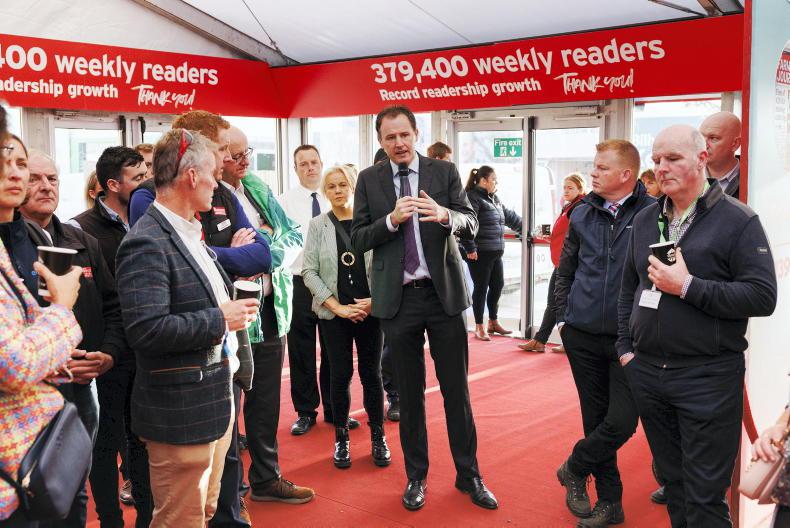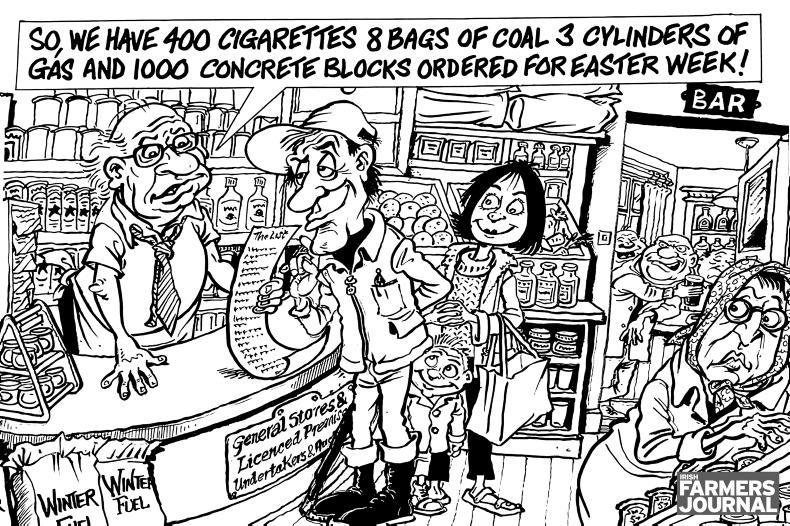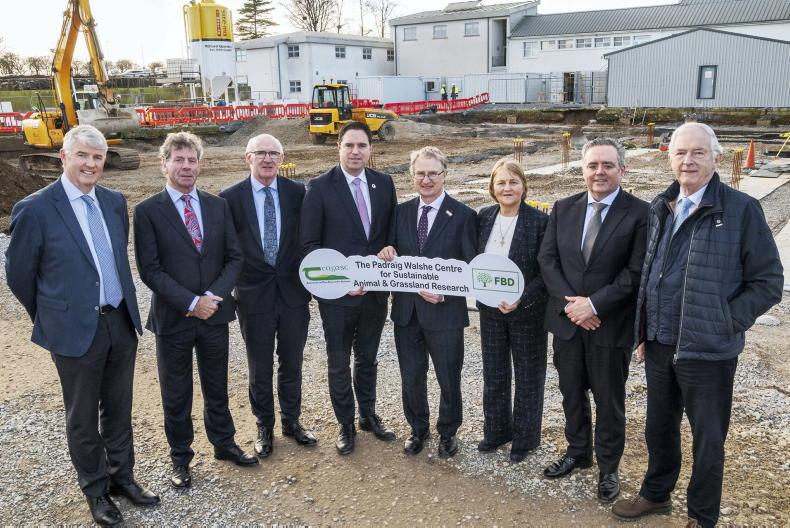The extent of the trouble in which Ireland and the EU energy policy finds itself was demonstrated in Tuesday’s budget when the Government committed €4.1bn to pay for everyday energy to keep businesses alive. In effect, the EU’s failed energy policy didn’t allow the Government make some long-term strategic energy moves in Budget 2023.
Rightly or wrongly, many farmers held an expectation that the budget would deliver something strategic on renewable energy that they could access. Solar energy is probably the area that has most appeal given every farm has shed roof space. The game-changer for solar will be the ability to sell excess energy from the farm. Minister for the Environment Eamon Ryan highlights this at every opportunity as a way for farmers to increase income by selling more than food from farms. However, words and promises are of little solace to farmers as Minister Ryan delivered little in the way of strategic moves on this.
The fact that the Renewable Heat Obligation is not in place leaves farmers bereft of this opportunity, while the lack of intention to introduce supports for anaerobic digestion compounds it. Reaching strategic 2030 targets for solar or anaerobic digestion is no closer with this budget.
Solar grant aid
For his part, Minister for Agriculture Charlie McConalogue rightly calls out the separate ceiling for solar grant aid up to €90,000 in TAMS to create energy for own use as a positive. However, exporting excess electricity to the grid from TAMS-funded solar panels is still not permitted. This flies in the face of Minister Ryan’s comments.
Farmers will rightly suggest that the last thing the EU wants to do now is allow its food policy to follow that of energy. Outsourcing food production and limiting the production capacity of EU countries could have far more serious consequences than outsourcing energy.
The Government largesse on overall budget spending in what is widely acclaimed as a giveaway budget did not flow into agriculture. Agriculture was kept below a 2% spending increase, while the departments of children, housing and health show a core spending increase of 19.7%, 8.1% and 5.6% respectively. At the same time, Minister McConalogue suggests all farm schemes have gotten stronger, and over €30m of next year’s budget is being forward-paid in 2022, with all CAP schemes fully funded with increased national funding.
Direct intervention up
When we compare to Budget 2022, the numbers suggest Minister McConalogue’s direct intervention in spending on agriculture is up between 5% and 12% year on year with spending in seafood up 91%.
The minister also suggests farmers and farming need to look at the budget in the round, and it is fair to say that farm families will gain from the other budget positives on income tax breaks, etc.
On the positive side, the rollover of the capital acquisitions and capital gains tax agricultural reliefs are welcomed. The establishment of a new €90 suckler cow payment to run alongside a €150/cow payment from CAP will benefit the smaller-scale suckler farmers along the western seaboard. The northwest region, which was classified by the EU this week as a “lagging” region, will gratefully accept this.
Sucker farmers
Larger suckler farmers in the east will rightly say they are much more negatively affected by the new CAP starting next year, and that convergence and front-loading works against them significantly.
The dairy sector will look to the accelerated capital allowance on slurry storage as a very big positive in Budget 2023. The concrete levy is negative but again this can be offset against current positive margins in dairy farming.
Some drystock farmers will have a gap year on an environmental scheme payment and while Minister McConalogue says he is continuing to work on this, it will be one that won’t sit well with farm organisations. These vulnerable farmers are on low incomes and nonexistent margins.
Also, the flat rate VAT rebate which will move from 5.5% to 5% will take an estimated €46m out of farmers’ pockets.
Finally, for farming to get just €28m directly from a €1bn Brexit Adjustment Reserve fund in Budget 2023 beggars belief. The minister suggests he’s still open to looking at options to help an Irish beef sector hugely exposed to new UK trade deals, so surely this must be the priority going forward.

Minister for Agriculture Charlie McConalogue speaking during the Irish Farmers Journal Breakfast Briefing at the National Ploughing Championships at Ratheniska, Co. Laois. \ Donal O' Leary
Capital allowance over two years a winner for dairy
The accelerated capital allowance over two years on the cost of concrete used in slurry tanks has to be a real winner for dairy farmers operating as sole traders, given current margins in the sector.
Yes, some dairy farmers are now trading as companies which means tax incentives are not as big an issue. However, the nitrate action plan and the derogation stipulate increased slurry storage, and all the signals from Department officials around storing nutrients suggest more storage will be required in the future.
Either way, storing nutrients to allow you use them at the right time for your business is a huge flexibility to build into your business, especially given the value of those nutrients has increased significantly in the last year.
If the concrete levy designed to pay for the Mica redress scheme and the cost of poor regulation in mainly two counties is passed on entirely to the end user, our preliminary analysis suggests that the cost of a single shed bay will increase by around €700. A three-bay will cost an extra €2,100 (see Martin Merrick in this week's edition).
Future-proofing your business even if you don’t have the resources to put cubicles and steel on top of the tank right now would be a good move for many dairy farmers who are tight on slurry or dirty water storage. I’d suggest the environmental benefits would far outweigh broad-brush reduced stocking rates.
Tillage farmers out in the cold after the budget
Tillage farmers feel hard done by after the Government released Budget 2023 on Tuesday.
Right now, they are planting winter crops and fertiliser needs to be purchased to secure availability for these crops.
Grain growers cannot avail of the €56m fodder scheme that livestock farmers avail of and yet grain growers produce winter feed in abundance.
There is merit in rewarding grain growers for the straw incorporation scheme, which improves soil health. The tillage incentive scheme is limited for specialist growers who cannot get access to grassland.
The risk-reward dilemma for grain growers planting now is very real. Surely something to de-risk these much-needed crops is warranted.
This week's cartoon

Garda property app a boost for farmers
It is positive to see rural crime under the spotlight and the development of new technology to help farmers secure what are increasingly more valuable assets on Irish farms.
In the last week, we have seen bare-faced thieves walk on to farms and steal power washers, field water troughs and mobile welders. Not alone is the loss of the equipment a huge negative for the farm business, but the actual thought of somebody invading your private space can often be more troubling for farmers.
The message is clear: get farm equipment marked, get the new Garda property app and report any stolen equipment.
Focus must remain on eradicating TB
Well done to the organisers of the TB regional meeting in Wicklow this week. A spotlight continuously needs to be shone on TB for what can be a very tough time financially, mentally and physically for farm families caught up in an outbreak.
It seems clear the relatively new science that showed animal-to-animal transfer of TB is possible is gathering momentum at Departmental of Agricultur level, and that the Department and IFA now seem at pains to get positive TB reactors off farm as quickly as possible.
We rapidly need to see more progress at eradicating TB in Ireland.
The extent of the trouble in which Ireland and the EU energy policy finds itself was demonstrated in Tuesday’s budget when the Government committed €4.1bn to pay for everyday energy to keep businesses alive. In effect, the EU’s failed energy policy didn’t allow the Government make some long-term strategic energy moves in Budget 2023.
Rightly or wrongly, many farmers held an expectation that the budget would deliver something strategic on renewable energy that they could access. Solar energy is probably the area that has most appeal given every farm has shed roof space. The game-changer for solar will be the ability to sell excess energy from the farm. Minister for the Environment Eamon Ryan highlights this at every opportunity as a way for farmers to increase income by selling more than food from farms. However, words and promises are of little solace to farmers as Minister Ryan delivered little in the way of strategic moves on this.
The fact that the Renewable Heat Obligation is not in place leaves farmers bereft of this opportunity, while the lack of intention to introduce supports for anaerobic digestion compounds it. Reaching strategic 2030 targets for solar or anaerobic digestion is no closer with this budget.
Solar grant aid
For his part, Minister for Agriculture Charlie McConalogue rightly calls out the separate ceiling for solar grant aid up to €90,000 in TAMS to create energy for own use as a positive. However, exporting excess electricity to the grid from TAMS-funded solar panels is still not permitted. This flies in the face of Minister Ryan’s comments.
Farmers will rightly suggest that the last thing the EU wants to do now is allow its food policy to follow that of energy. Outsourcing food production and limiting the production capacity of EU countries could have far more serious consequences than outsourcing energy.
The Government largesse on overall budget spending in what is widely acclaimed as a giveaway budget did not flow into agriculture. Agriculture was kept below a 2% spending increase, while the departments of children, housing and health show a core spending increase of 19.7%, 8.1% and 5.6% respectively. At the same time, Minister McConalogue suggests all farm schemes have gotten stronger, and over €30m of next year’s budget is being forward-paid in 2022, with all CAP schemes fully funded with increased national funding.
Direct intervention up
When we compare to Budget 2022, the numbers suggest Minister McConalogue’s direct intervention in spending on agriculture is up between 5% and 12% year on year with spending in seafood up 91%.
The minister also suggests farmers and farming need to look at the budget in the round, and it is fair to say that farm families will gain from the other budget positives on income tax breaks, etc.
On the positive side, the rollover of the capital acquisitions and capital gains tax agricultural reliefs are welcomed. The establishment of a new €90 suckler cow payment to run alongside a €150/cow payment from CAP will benefit the smaller-scale suckler farmers along the western seaboard. The northwest region, which was classified by the EU this week as a “lagging” region, will gratefully accept this.
Sucker farmers
Larger suckler farmers in the east will rightly say they are much more negatively affected by the new CAP starting next year, and that convergence and front-loading works against them significantly.
The dairy sector will look to the accelerated capital allowance on slurry storage as a very big positive in Budget 2023. The concrete levy is negative but again this can be offset against current positive margins in dairy farming.
Some drystock farmers will have a gap year on an environmental scheme payment and while Minister McConalogue says he is continuing to work on this, it will be one that won’t sit well with farm organisations. These vulnerable farmers are on low incomes and nonexistent margins.
Also, the flat rate VAT rebate which will move from 5.5% to 5% will take an estimated €46m out of farmers’ pockets.
Finally, for farming to get just €28m directly from a €1bn Brexit Adjustment Reserve fund in Budget 2023 beggars belief. The minister suggests he’s still open to looking at options to help an Irish beef sector hugely exposed to new UK trade deals, so surely this must be the priority going forward.

Minister for Agriculture Charlie McConalogue speaking during the Irish Farmers Journal Breakfast Briefing at the National Ploughing Championships at Ratheniska, Co. Laois. \ Donal O' Leary
Capital allowance over two years a winner for dairy
The accelerated capital allowance over two years on the cost of concrete used in slurry tanks has to be a real winner for dairy farmers operating as sole traders, given current margins in the sector.
Yes, some dairy farmers are now trading as companies which means tax incentives are not as big an issue. However, the nitrate action plan and the derogation stipulate increased slurry storage, and all the signals from Department officials around storing nutrients suggest more storage will be required in the future.
Either way, storing nutrients to allow you use them at the right time for your business is a huge flexibility to build into your business, especially given the value of those nutrients has increased significantly in the last year.
If the concrete levy designed to pay for the Mica redress scheme and the cost of poor regulation in mainly two counties is passed on entirely to the end user, our preliminary analysis suggests that the cost of a single shed bay will increase by around €700. A three-bay will cost an extra €2,100 (see Martin Merrick in this week's edition).
Future-proofing your business even if you don’t have the resources to put cubicles and steel on top of the tank right now would be a good move for many dairy farmers who are tight on slurry or dirty water storage. I’d suggest the environmental benefits would far outweigh broad-brush reduced stocking rates.
Tillage farmers out in the cold after the budget
Tillage farmers feel hard done by after the Government released Budget 2023 on Tuesday.
Right now, they are planting winter crops and fertiliser needs to be purchased to secure availability for these crops.
Grain growers cannot avail of the €56m fodder scheme that livestock farmers avail of and yet grain growers produce winter feed in abundance.
There is merit in rewarding grain growers for the straw incorporation scheme, which improves soil health. The tillage incentive scheme is limited for specialist growers who cannot get access to grassland.
The risk-reward dilemma for grain growers planting now is very real. Surely something to de-risk these much-needed crops is warranted.
This week's cartoon

Garda property app a boost for farmers
It is positive to see rural crime under the spotlight and the development of new technology to help farmers secure what are increasingly more valuable assets on Irish farms.
In the last week, we have seen bare-faced thieves walk on to farms and steal power washers, field water troughs and mobile welders. Not alone is the loss of the equipment a huge negative for the farm business, but the actual thought of somebody invading your private space can often be more troubling for farmers.
The message is clear: get farm equipment marked, get the new Garda property app and report any stolen equipment.
Focus must remain on eradicating TB
Well done to the organisers of the TB regional meeting in Wicklow this week. A spotlight continuously needs to be shone on TB for what can be a very tough time financially, mentally and physically for farm families caught up in an outbreak.
It seems clear the relatively new science that showed animal-to-animal transfer of TB is possible is gathering momentum at Departmental of Agricultur level, and that the Department and IFA now seem at pains to get positive TB reactors off farm as quickly as possible.
We rapidly need to see more progress at eradicating TB in Ireland.











SHARING OPTIONS